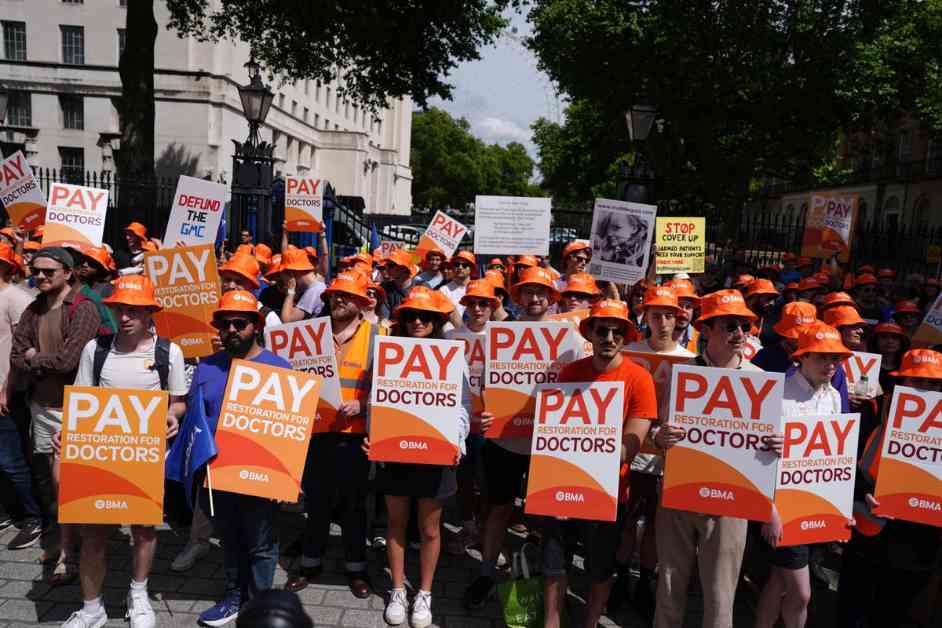Junior Doctors in England Accept Government Pay Offer: What This Means
Junior doctors in England have finally reached a resolution in their long-standing dispute with the government over pay. After voting to accept a pay deal worth 22.3% on average over two years, the British Medical Association’s (BMA) junior doctors committee (JDC) announced that 66% of junior doctors voted in favor of the deal. This decision brings an end to a tumultuous period that saw junior doctors taking industrial action 11 times in the past 22 months, with their last strike occurring just days before the general election.
The Impact of the Pay Deal
The newly accepted pay deal will result in a pay rise of between 3.71% and 5.05% for junior doctors, averaging 4.05% on top of their existing pay award for 2023/24. This increase will be backdated to April 2023. Additionally, each part of the pay scale will be uplifted by 6%, along with an additional £1,000, as recommended by the Review Body on Doctors’ and Dentists’ Remuneration (DDRB), with an effective date of April 1, 2024. These adjustments mean that a doctor starting foundation training in the NHS will now see their base pay rise to £36,600, up from approximately £32,400. Similarly, a full-time doctor entering specialty training will experience a basic pay increase to £49,900 from around £43,900.
Beyond the financial aspects of the deal, the Government has also agreed that from September 18, “junior doctors” across the UK will be known as “resident doctors” to better reflect their expertise. This change follows a motion passed at the BMA’s annual policy-making conference in 2023, signaling a significant shift in the terminology used to refer to these medical professionals.
A Long-Awaited Resolution
Dr. Robert Laurenson and Dr. Vivek Trivedi, co-chairs of the JDC, expressed their relief at finally reaching a resolution, stating, “It should never have taken so long to get here, but we have shown what can be accomplished with our determination and with a government willing to simply sit down and talk realistically about a path to pay restoration. One strike was one strike too many.” They emphasized the significance of the deal, marking the end of 15 years of pay erosion and the beginning of two years of modest above-inflation pay rises.
Looking Ahead
While the acceptance of the pay offer signifies a step in the right direction, there is acknowledgment that there is still work to be done. Despite the pay uplift, doctors remain 20.8% behind in real terms compared to 2008 levels. The co-chairs of the JDC highlighted the importance of continued efforts to address this gap and ensure fair compensation for all doctors. They also emphasized the need for ongoing collaboration with the Government to streamline reporting mechanisms for additional hours worked and address training bottlenecks that have contributed to shortages in consultant and GP doctors.
Health Secretary Wes Streeting expressed his satisfaction that the BMA has accepted the Government’s pay deal, noting, “We inherited a broken NHS, the most devastating dispute in the health service’s history, and negotiations hadn’t taken place with the previous ministers since March. Things should never have been allowed to get this bad.” Streeting emphasized the importance of ending the strikes swiftly to prepare for the upcoming winter pressures on the NHS and outlined the Government’s commitment to cutting waiting lists, reforming the health service, and ensuring its sustainability for the future.
Moving forward, the resident doctors committee, as they will now be known, will focus on building upon the progress made in securing fair pay for junior doctors. Their goal is to ensure that future cohorts of doctors do not face the same challenges and uncertainties regarding their compensation. The co-chairs expressed gratitude to all doctors who stood in solidarity during the dispute and emphasized the ongoing nature of the campaign for fair pay.
In conclusion, the acceptance of the Government’s pay offer by junior doctors in England signifies a significant milestone in their fight for fair compensation. While the deal marks a step towards addressing long-standing pay discrepancies, there is a recognition that more work is needed to fully restore pay levels and ensure equitable treatment for all medical professionals. The resolution of this dispute highlights the power of collective action and collaboration in achieving meaningful change within the healthcare system.












